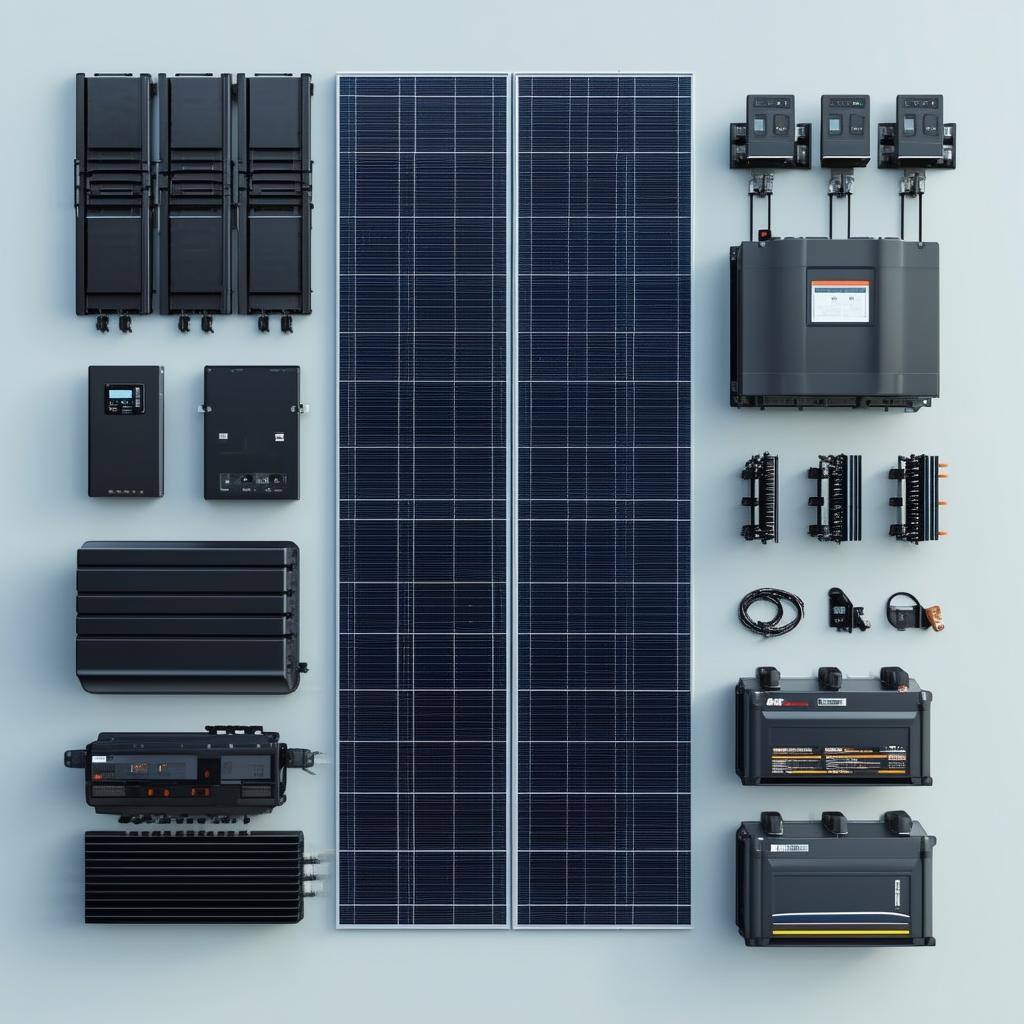How to Choose Solar Products: Panels, Inverters, Batteries
Choosing the right solar products is one of the most important steps in setting up a solar power system that’s both efficient and durable. With so...
7 min read
Peter Swenson : Oct 28, 2024 5:05:59 PM

When you think about going solar, you probably picture panels on your roof soaking up sunlight and turning it into electricity to power your home. But there’s another piece of the puzzle that’s gaining a lot of attention—solar batteries. Solar batteries allow you to store the energy your panels produce, giving you greater control over how and when you use it. But here’s the million-dollar question: Are solar batteries worth it?
Adding battery storage to a solar system comes with its own set of pros and cons. Batteries can give you backup power during outages, increase your energy independence, and even save you money in some situations. On the flip side, they’re an additional investment, and not every home necessarily needs one. In this guide, we’ll dive into the benefits, costs, and factors that make batteries worth considering, so you can make an informed decision about whether solar batteries are a worthwhile investment for you.
Before we get into the details, let’s quickly outline the pros and cons of adding battery storage to your solar system.
Batteries can be a great addition to a solar system, but they aren’t essential for everyone. Let’s take a closer look at the specific benefits to help you decide if they’re right for you.
The decision to add a battery to your solar system often comes down to three main benefits: backup power, energy independence, and savings on electricity during peak hours. Let’s explore each of these advantages in more detail.
One of the biggest reasons homeowners add batteries to their solar systems is for backup power during outages. When the power goes out, whether due to a storm, grid failure, or planned maintenance, a solar battery can kick in to keep essential parts of your home powered. This means your refrigerator, lights, and even Wi-Fi can stay on until power is restored.
Why It Matters: Power outages are inconvenient, but they can also be costly if you lose perishable goods or need to relocate until power is restored. For families with medical devices or those who work from home, the impact can be even more severe.
How It Works: During an outage, your solar system disconnects from the grid, and the battery supplies power to your home. Batteries typically can’t power an entire house, but you can prioritize essential appliances and circuits.
Backup power is especially valuable in areas prone to extreme weather or in states like California, where rolling blackouts are increasingly common. With a solar battery, you can ride out these outages with greater comfort and security.
For many, energy independence is one of the most appealing aspects of adding a battery to their solar setup. Solar panels generate power during the day, but without a battery, any excess power you don’t use immediately goes back to the grid. With a battery, you can store this energy and use it later, which means you rely less on the utility grid.
Reduced Grid Dependency: If you’re concerned about utility rate increases or want more control over your power supply, a battery lets you rely more on the power you generate yourself. This can be particularly useful for homeowners in remote areas where grid reliability is a concern.
Greater Energy Control: Having a battery gives you control over when to use stored energy versus grid energy. This is useful not only for independence but also for managing costs.
Energy independence doesn’t necessarily mean going off-grid, but it does mean reducing your reliance on external power sources. If independence and self-reliance are important to you, a battery can make a meaningful difference.
In many states, utilities have shifted to time-of-use (TOU) rates, which charge different rates depending on when you use electricity. Typically, peak hours (when rates are higher) occur in the evening when demand is high, while off-peak hours (when rates are lower) are usually in the middle of the day.
How Batteries Help with TOU Rates: By storing energy during off-peak hours, you can use that stored power during peak hours to avoid high rates. In this way, batteries help you take full advantage of TOU pricing structures.
Cost Savings: Using a battery to manage TOU rates can lead to substantial savings on your electricity bill, especially in areas with significant rate differences between peak and off-peak hours.
For homeowners in areas with TOU rates, batteries can help balance out costs, allowing you to optimize your energy usage to match the most affordable times.
Not all batteries are created equal. Different types of batteries offer different advantages in terms of cost, lifespan, efficiency, and maintenance. Here’s an overview of the most common types of solar batteries available today.
Lithium-ion batteries are by far the most popular choice for residential solar systems, thanks to their high efficiency, long lifespan, and low maintenance needs.
Efficiency: Lithium-ion batteries have a high round-trip efficiency, meaning they lose very little energy during the charge and discharge process, which translates to more usable power.
Lifespan: These batteries generally last between 10 and 15 years, making them a durable choice that pairs well with the lifespan of solar panels.
Popular Brands: Some of the most well-known lithium-ion options include the Tesla Powerwall, LG Chem RESU, and Sonnen.
Cons: The main drawback of lithium-ion batteries is the cost, as they’re the most expensive type of battery on the market.
Lead-acid batteries have been used for decades, especially in off-grid applications. They’re more affordable than lithium-ion batteries, but they come with a few trade-offs.
Efficiency: Lead-acid batteries are less efficient than lithium-ion, which means you lose more energy during the charge-discharge process.
Lifespan: The lifespan of lead-acid batteries is typically 5 to 10 years, shorter than lithium-ion batteries.
Types: There are two main types of lead-acid batteries: flooded (requires maintenance) and sealed (maintenance-free). Sealed batteries are generally more convenient for homeowners.
Cons: Lead-acid batteries require more frequent maintenance and have a lower energy density, meaning they take up more space.
Beyond lithium-ion and lead-acid, there are alternative battery technologies, though they’re less commonly used in residential solar systems.
Flow Batteries: These batteries use liquid electrolytes to store energy and offer long lifespans and high durability. However, they’re expensive and more suitable for commercial applications.
Saltwater Batteries: An eco-friendly alternative, saltwater batteries don’t contain heavy metals, making them easier to recycle. However, they’re relatively new and not as widely available.
When choosing a battery type, consider factors like cost, lifespan, maintenance, and efficiency. Lithium-ion is the top choice for most homeowners, but lead-acid can be a budget-friendly alternative if you’re comfortable with the trade-offs.
Adding battery storage to your solar system can be a substantial investment. Let’s look at what you can expect in terms of costs and potential return on investment.
Lithium-Ion Batteries: These batteries typically cost between $7,000 and $15,000 per unit, depending on capacity and brand. Installation fees can add an additional $1,000 to $2,000.
Lead-Acid Batteries: A lead-acid battery system is generally more affordable, costing around $5,000 to $8,000. However, lead-acid batteries have a shorter lifespan and may need to be replaced sooner.
Other Batteries: Flow and saltwater batteries vary widely in price, but they tend to be on the higher end, often starting at $10,000 and up.
The ROI on a solar battery depends on factors like electricity rates, battery usage, and available incentives. In areas with TOU rates or frequent outages, the ROI can be more attractive because of the immediate savings and added reliability.
Time-of-Use Savings: If you save an average of $100 per month by avoiding peak rates, that’s $1,200 per year in savings. With a $10,000 battery, your payback period would be about 8-10 years.
Backup Power Value: While it’s hard to put a dollar value on backup power, if you live in an area with frequent outages, having power during a blackout can be worth the investment.
Incentives and Rebates: Some states offer rebates or incentives for battery storage, which can reduce the upfront cost and improve your ROI. Check with your local utility provider to see what’s available.
While the payback period for solar batteries can vary, many homeowners find that the peace of mind and potential savings make the investment worthwhile.
Not everyone needs a solar battery, but certain situations make them a more attractive or even essential option. Here are some scenarios where adding a battery is especially beneficial.
In areas without net metering, homeowners don’t receive credits for excess energy sent to the grid, making batteries a smart choice. With a battery, you can store any surplus energy instead of sending it to the grid for little or no compensation.
If your utility provider has time-of-use rates, a battery can save you money by letting you use stored power during peak pricing hours. In these cases, batteries often pay for themselves more quickly through reduced energy bills.
If you live in an area prone to power outages, a battery provides reliable backup power, allowing you to maintain essential services when the grid goes down. This is particularly valuable in regions with extreme weather or unreliable grid infrastructure.
For homeowners in remote areas with limited or unreliable grid access, solar batteries can provide a more consistent power source, allowing you to live “off the grid” or reduce dependence on traditional power.
If any of these scenarios apply to you, investing in a battery may be worth considering, as it could improve your overall solar experience and add convenience, savings, and security.
Deciding whether to add a battery to your solar system comes down to your specific needs, budget, and long-term energy goals. While batteries are an added cost, they offer benefits that go beyond just financial savings, like energy independence, backup power, and control over your electricity use. Here’s a quick summary to help you decide:
In the end, the decision to add a battery to your solar system is a personal one. Consider your energy needs, financial situation, and lifestyle to determine if the benefits of a solar battery align with your goals. For many homeowners, batteries are a worthwhile addition that enhances the overall solar experience and provides greater control, savings, and security.

Choosing the right solar products is one of the most important steps in setting up a solar power system that’s both efficient and durable. With so...

Welcome to the world of solar energy! Whether you're just exploring the possibilities or seriously considering installing a solar power system, it's...

So, you’re thinking about going solar? Great choice! Solar power is one of the best ways to save on electricity bills, reduce your carbon footprint,...